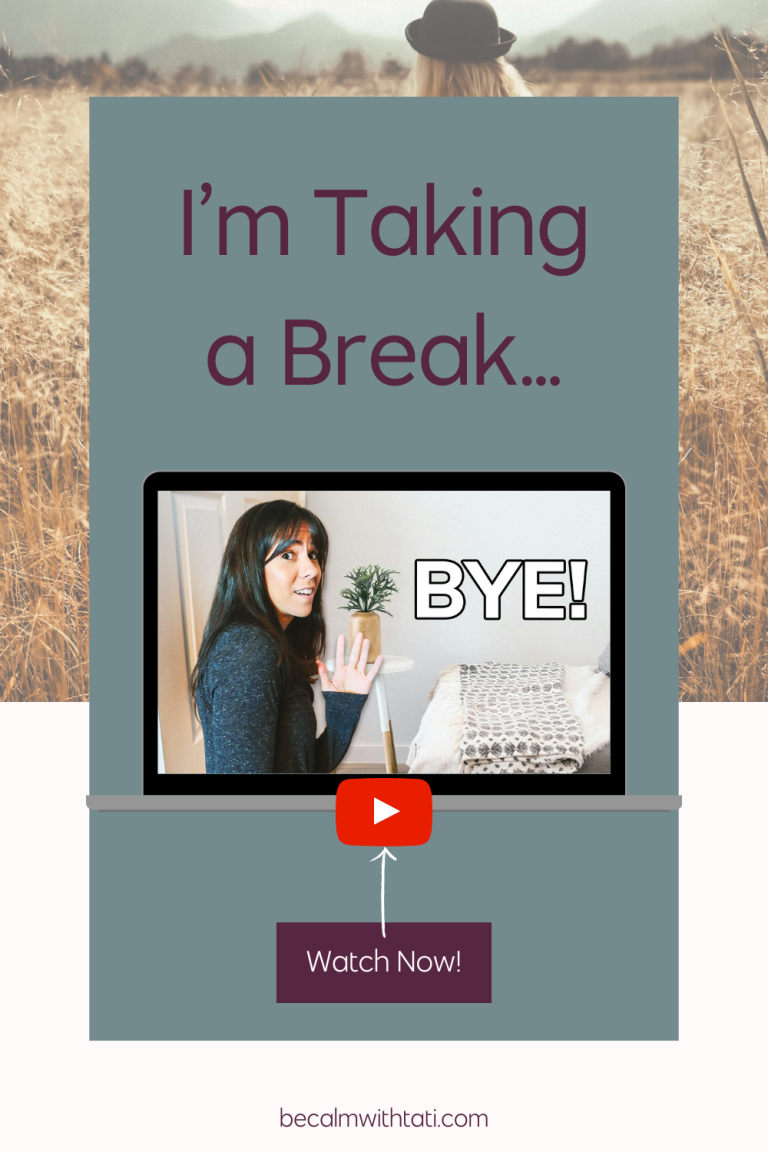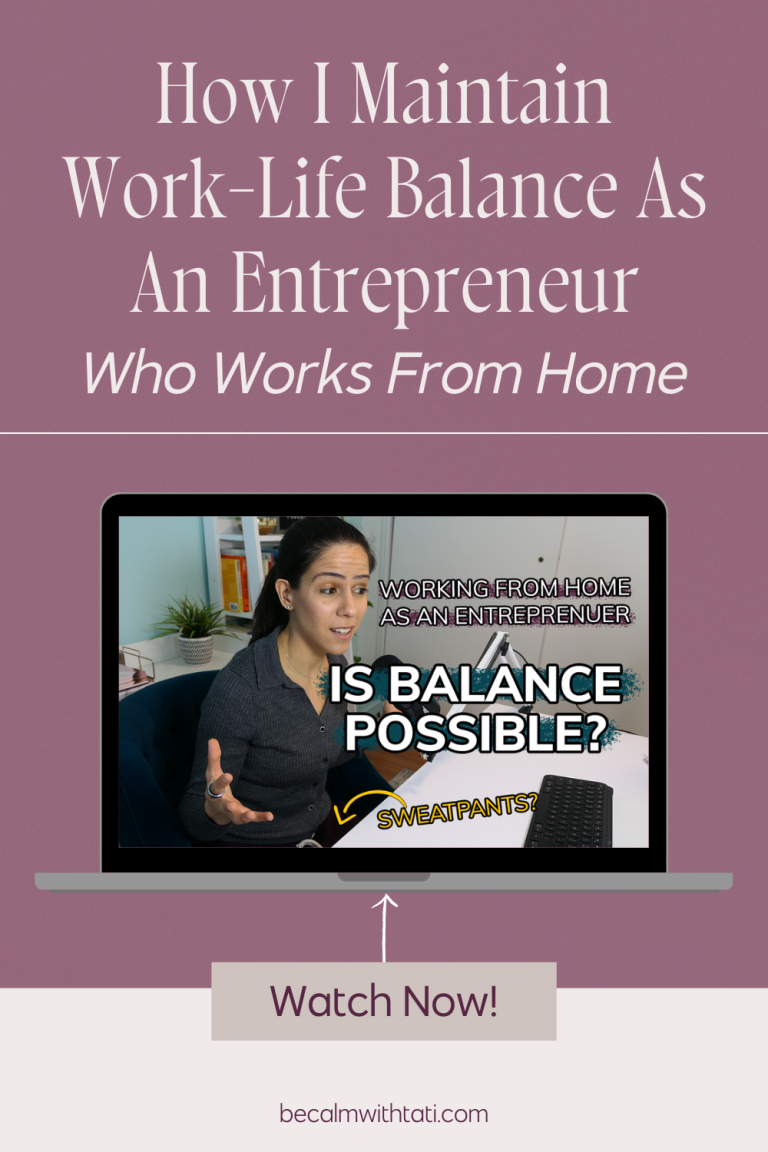Have you been procrastinating going to therapy? Maybe you are in a place where you’re struggling: you’re burnt-out, overwhelmed, anxious, depressed, or all of the above… and you know therapy might help, but you just haven’t taken the leap. It feels hard to take that first step and there are so many fears that arise and rationalizations that make it easier for you to put off. Many people wait weeks, months, or even years before taking the leap—OR until it gets so bad they absolutely have to. If you think therapy might help but have been too afraid to take the leap, this episode is for you.
In this episode, you will learn:
- The negative impacts of avoiding therapy when things are difficult
- How to effectively address the reasons you are probably avoiding therapy so you can feel empowered to take the leap
- Therapist-approved resources to help you find a therapist, along with some alternatives to therapy
👩🏼⚕️ Therapy Resources:
Open Path Collective (affordable therapy): https://openpathcollective.org/
Inclusive Therapists: https://www.inclusivetherapists.com/locations
Psychology Today Directory: https://www.psychologytoday.com/us/therapists
Therapy Den Directory: https://www.therapyden.com/
Neurodivergent Therapists: https://ndtherapists.com/
Mental Health Match: https://mentalhealthmatch.com/search/start?zip=
Therapy for Latinx: http://www.therapyforlatinx.com/
Asian Mental Health Collective: https://www.asianmhc.org/
Therapy for Black Girls: https://providers.therapyforblackgirls.com/
Therapy for Black Men: https://therapyforblackmen.org/therapists/
Do you need therapy or coaching? https://www.becalmwithtati.com/therapy-or-coaching/
LISTEN NOW:
🎧 CLICK HERE TO LISTEN TO CALMLY COPING WHEREVER YOU LISTEN TO PODCASTS
WATCH NOW:
FREE TRAINING: How to Create Work-Life Balance and Feel Calmer From Within
If you want to learn how to take back control of your life so you can feel calmer and more confident, and learn the tools to spend your time according to what matters most to you (no matter what your schedule is like right now)…

LISTEN, REVIEW, AND SUBSCRIBE TO THE PODCAST!
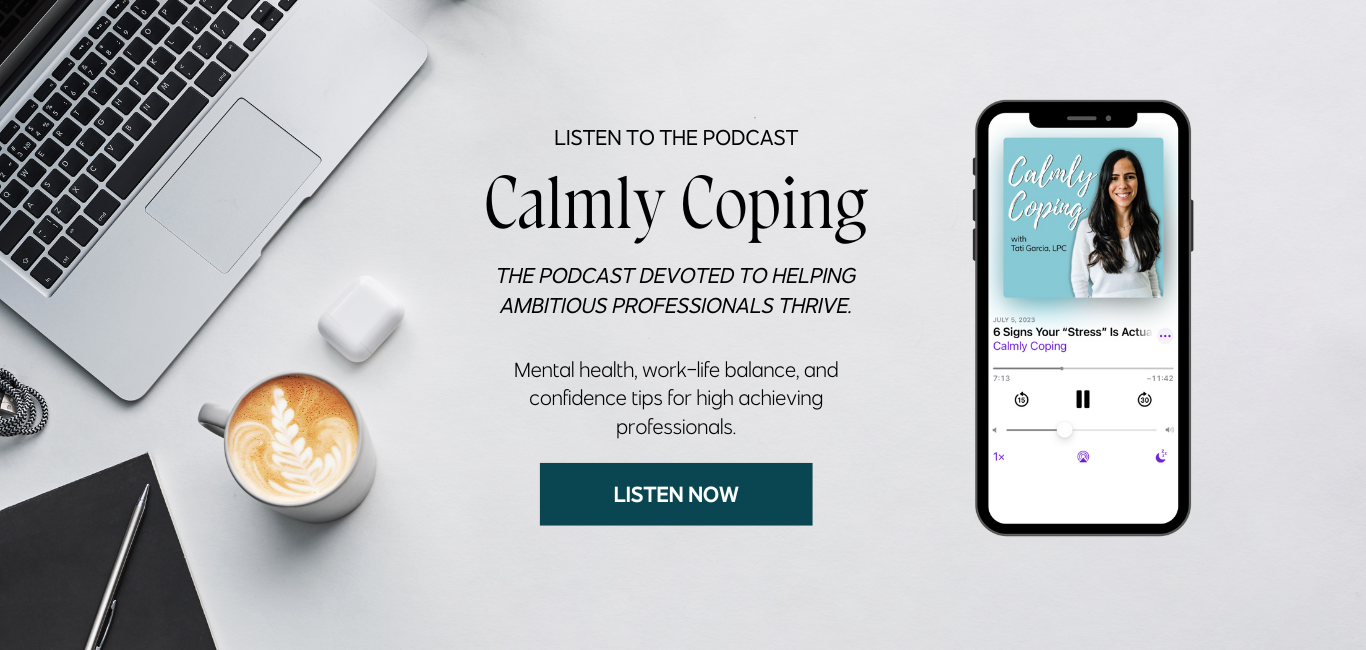
INTRO/OUTRO MUSIC: Rescue Me (Instrumental) by Aussens@iter (c) copyright 2018 Licensed under a Creative Commons Attribution (3.0) license. http://dig.ccmixter.org/files/tobias_weber/57990 Ft: Copperhead
DISCLAIMER: All content here is for informational purposes only. This content does not replace the professional judgment of your own mental health provider. Please consult a licensed mental health professional for all individual questions and issues.
Interested in diving deeper to get support for high-functioning anxiety?
I offer 1:1 coaching to help high-achievers overcoming high-functioning anxiety so they can feel calmer, more present, and have improved balance in their lives. Click here if you’re interested in learning more and getting started.
Calm, Balanced, & Confident is my comprehensive A→Z self-paced course to help high-achieving professionals overcome high-functioning anxiety so they can feel calmer, balanced, and more confident without the anxiety and overwhelm. Click here to learn more and enroll today.
Looking for ongoing support and guidance with high-functioning anxiety? The Calm & Ambitious Community is the exclusive community for high achievers with high-functioning anxiety. Click here to learn more and join us today!
TRANSCRIPT:
Click to view the episode transcript.
Have you been procrastinating going to therapy? Maybe you’re in a place where you’re struggling, you’re feeling burnt out, overwhelmed, anxious, depressed, or all of the above. And you know therapy might help, but you just haven’t taken the leap. It feels hard to take that first step, and there are so many fears that arise and rationalizations that make it easier for you to put off.
Many people wait weeks, months, or even years before taking the leap to go into therapy, or until it gets so bad that they have no other option. If you think therapy might help, but you’ve been too afraid to take the leap, then this episode is for you.
Welcome to Calmly Coping. My name is Tati Garcia, and I’m a licensed therapist and coach specializing in high functioning anxiety. I help high achievers stop putting themselves last so they can feel more calm, balanced, and confident from within. If this topic interests you, then like, subscribe, and hit the notification bell so you will be notified every time I release a new episode.
Thank you so much for tuning in. So like I said, so many people wait so long to go into therapy, and if that’s you, that’s okay. There’s no shame in that. It can be really hard to take the leap to go into therapy. Even me as a therapist, it took me a while to gain the confidence and the courage to seek out help and to find a therapist.
And there are a lot of reasons why that can be. But what can happen if you continue to procrastinate therapy when it could be something that could be beneficial to you is that this avoidance can build up and this pushing off, addressing your problems can come out in other ways. It can negatively impact your relationships.
It can negatively impact how you show up at work, your self care, because when you’re not caring for yourself by going to therapy, you’re also. unconsciously communicating to yourself that you’re not worthy of getting help or support, and so that can make you feel less confident in yourself as a result.
It can also result in physical symptoms and illness, and even though this might seem unrelated, stress and especially chronic stress can build up in the body. It can cause inflammation inside your body and certain organs, and that can lead to physical symptoms and illness, and it can also result in a lot of tension in the body, especially with stress and anxiety.
Your body can tense up when you’re in a state of feeling like something is going wrong or you need to prepare yourself for the worst. And so this chronic tensing of your body can result in a lot of physical pain and discomfort. So there are a lot of reasons why Avoiding therapy can be something that is more harmful for you than helpful.
So first, what can avoiding therapy look like? So it can look like procrastination saying, okay, I’ll find a therapist or I’ll look for a therapist next week. And then you continue to put it off and put it off and put it off. It can also look like coming up with excuses like, okay, I’m going to wait until I get new insurance or until I have more time in my schedule or until I get in better shape or things that might even seem unrelated. So coming up with excuses for why you need to put off going to therapy or maybe you can convince yourself that you can handle it on your own. Like I can deal with this. You know, if I go to therapy, then that means that there must be really something wrong with me.
And so avoiding it means. That it’s really not that big of a deal, and I know I can handle this and this isn’t that big of a deal and this person can deal with it. So that means that I can deal with it. And so you’re kind of in a way rationalizing and saying that you can handle what’s coming up, even though it is perfectly okay and normal to get the help and support of a professional.
You wouldn’t hesitate to go to the doctor if you felt sick, unless you’re somebody with health anxiety maybe. But for the most part, you wouldn’t hesitate to go to an accountant if you need help with your taxes or you wouldn’t hesitate to go to a Realtor if you’re looking for a house. However, it can be so easy to hesitate with getting help from a mental health professional because of the way that our culture and society looks at getting support for mental health.
Even though things have improved drastically over the last 10 to 20 years, when it comes to the de stigmatization of mental health, there are still a lot of negative attitudes about it. And so that can make it even more challenging to find and seek a therapist. Let’s kind of dive into the reasons why I touched on a few of them.
Why you may struggle with seeking out therapy, and I’m going to break down and address each of these one by one so that you can go through the process with me if any of these reasons resonate with you to address them head on. So the first could be the fear of facing your past, facing pain or discomfort, or being vulnerable.
This can be something that, especially if you’ve never been to therapy, is a very new experience. The idea of sharing things that you’ve never shared with anybody else And the idea of addressing potentially past pain and trauma can feel really overwhelming and it can feel like it’s uncharted territory and you don’t know how to handle it.
And this is a valid reason. You know, it can be hard to face these things. However, if you don’t face these things, then it’s just going to get worse many times. It’s not going to get better on its own, especially if you had a difficult past or have gone through something stressful. It’s not something that necessarily just fixes itself without you addressing and processing and working through these things, because that can just get you into a cycle of continued avoidance. And so how you can address this is also realizing that the therapist is trained in this. They are trained to be present and compassionate and nonjudgmental when it comes to the things that you’re sharing with them.
They are trained to be present for you and be a support and help to guide you through this process. Many therapists that you’re going to meet with. I have heard many things before, and so they are used to and not going to be judgmental when it comes to the things that you’re sharing with them. They’re going to be open and accepting, at least if they’re a good therapist.
And so this can help you with the process of feeling more comfortable going and showing up, knowing that you’re not doing this alone. Your therapist is a guide to help you through the process and is not going to push you further than you are ready to go. Oftentimes if you’ve never been it can feel really vulnerable to talk about certain things and part of the process of opening up about your emotions and how you’re feeling and difficult things for you is actually what’s going to help you to heal and having that space and container to do that can be very healing in and of itself.
Another reason why you may avoid going to therapy is because you’ve become comfortable being uncomfortable. So what I mean by this is that you’re in your place of feeling anxious or avoiding things in your life or feeling unmotivated all the time or depressed or however you’re feeling and this has become familiar to you.
It’s something that even though you may not like it a lot, it’s something that you can feel resistance to getting out of that place. And that’s because our bodies, our minds want to stay in the comfortable, in the familiar, even if it’s not the best for us. Our minds and our body want to be in a state of the familiar.
And so, that’s why making any change, even for the better, can feel challenging. It can feel difficult. But just know that Doing this is a part of the process. It’s going to help you grow and feel better. So if you’re in this place where you’re comfortable in your environment, in your kind of bubble that you have created or in your discomfort, know that it’s okay to feel that way and If you can get the courage to take even one small step towards getting help and getting support, then that is going to ultimately help you begin that journey towards healing and towards feeling better.
Maybe you’re afraid of what other people will think, especially if you have family members or colleagues or friends who are judgmental when it comes to mental health. Or they say a lot of negative things, like, oh, you don’t need to go to therapy, or there’s nothing wrong with you, or what’s wrong with you, you should just be able to push through.
And so, if you have heard a lot of these messages growing up, or you’re still hearing them, then these things can be internalized. Even if you may not believe them yourself, you might have some of these beliefs within you, because it’s the messages that we have absorbed throughout our lives. So you may be afraid of judgment from others, and if that’s the case, then it’s important to recognize that somebody who is judging therapy oftentimes probably isn’t aware of the benefits, and it is something that they have learned themselves.
Going to therapy isn’t something that you have to share with everybody or anybody. Especially if you’re an adult, it can be something that you keep to yourself. If you feel like you may be judged or stigmatized by others. And at the same time, you know, going to therapy is not something that you have to feel ashamed of.
There’s nothing wrong with going to therapy. It doesn’t mean that there’s something wrong with you. It doesn’t mean that you’re broken. It doesn’t mean that you’re flawed. In fact, many, many people go to therapy. And honestly, I see going to therapy as a strength. because it is a sign of somebody who is willing to look inward and willing to do and take the uncomfortable steps of making changes and reflecting upon themselves and improving upon themselves and feeling better in their day to day.
So there is nothing inherently wrong with going to therapy and it says more about the people who are judging you and about their view of things and the way that they are potentially as people than it does about you. What if you have financial concerns about going to therapy? So what if you’re concerned therapy is expensive?
I can’t afford it. I don’t have insurance. So this is definitely a valid concern as well. And you know, if you do have health insurance, then you can certainly find a provider who is in network. with your health insurance so that it is something that is more attainable or affordable for you. I’m going to share actually more suggestions about resources for therapy and finding a therapist at the end of this episode and I’m going to share some resources if you’re a person who is struggling with financial concerns.
However, there are many options when it comes to going to therapy. There are therapists who offer a sliding scale depending upon your income. There is therapy that is free or low cost. depending upon your insurance or your location. And there are also, if you can afford therapy, there are also options to pay for therapy out of pocket and or get reimbursed by your insurance provider.
If you’re seeing a provider who. isn’t in network with your insurance. I know navigating the maze of insurance and benefits can be really confusing and overwhelming. And so if you’re ever unsure, you can always reach out to your insurance directly, or you can reach out to a therapist you’re interested in working with and just ask them, do you accept my insurance?
How much would this be? What would this look like so that you can get more guidance on the issue? Ultimately when it comes to the financial aspect I think it’s really valuable to look at therapy as an investment in yourself The same way that you would pay for something that you find to be valuable and important We all for the most part are able to put money towards the things that mean something to us that we find important So whether that is experiences going on vacation or buying things that you enjoy.
Therapy is another piece of that puzzle. It is something that can be adding value to your life by investing in it. And so I encourage you to shift that mindset when it comes to any form of self care, it is a way of investing in your mental health and wellbeing. And so whatever that looks like for you.
So another fear could be, what if it doesn’t actually help? You know, what if I go and I find a therapist that I don’t like or that doesn’t help me or that makes things worse, what then? So, this is also a valid concern and, you know, the reality is that you’re never gonna know unless you try. So you can be stuck in this place of, well, what if this doesn’t help?
But if you never try, then you’re just going to be continuing to struggle and not even making an effort or a change to see if it could possibly help. And it’s also possible to get a sense for the therapist that you want to work with. Many therapists offer free consultation calls so that you can have a conversation with them and see if It’s a good fit beforehand, and even in the first few sessions, if you feel like this isn’t a good fit or there’s something that isn’t clicking or the chemistry isn’t there or whatever, then you absolutely have the right as a client to let your therapist know that and find another therapist, of course, saying it in a We’re going Respectful way that I feel like this isn’t the right fit for me, or I’d like to explore seeing another therapist.
And that is something that is perfectly okay and that we as therapists completely understand maybe you’re feeling unsure about or overwhelmed by the process. So if that’s you keep listening to this episode ’cause I’ll be sharing more about. that process and what it can look like. And it’s perfectly understandable to be in that place.
If you’ve never sought out therapy, if you have no idea what that looks like to find a therapist or to move forward in the process, or maybe you’re in the place where you’ve had bad experiences with therapy or therapists in the past, maybe you were forced to go to therapy in childhood and you really didn’t like it.
Or maybe you’ve had a therapist in the past that you had a bad taste in your mouth about and you feel like. Oh, therapy isn’t helpful. Or maybe you had an experience where you weren’t ready to dive into or explore the things that were being discussed in therapy because it felt like it was too much for you or, you know, you just weren’t in the place to fully take advantage of this.
And so as a result, you feel like therapy is just not helpful for me. It’s important to recognize that each and every therapist, just like each and every person, is different and unique. And so just because you had a bad experience with a therapist in the past does not mean that every experience with therapy is going to be the same.
Every therapist brings with them their own unique approach and perspective. I really encourage you to recognize that. Okay, just because you had a bad experience in the past does not mean you will have a bad experience in the future. It’s the same way with going to a medical doctor. You know, let’s say you had a bad experience with going to the doctor in the past or you got suggestions or feedback or you know, they didn’t have great bedside manner.
That does not mean that you’re never going to go to the doctor again. overgeneralize and see that well, therapy doesn’t help because it hasn’t helped them in the past. And I encourage you to try and step out of that. mindset and see that just because therapy didn’t help with that therapist or at that time in your life does not mean that therapy doesn’t help, period.
Therapy is very helpful and can be very helpful if you are finding the right fit for you and your needs. Another reason why you may be fearful of going to therapy is that you’re afraid to ask for help and you feel like you should be able to do it on your own. I mentioned this before and it’s. I think totally normal to be in a place of feeling difficulty asking for help.
It’s hard to admit that you need help and support because many times we view this as a weakness, as a sign that there’s something wrong or you’re not good enough yourself to handle it. That is absolutely not true. In fact, asking for help is a sign of courage and a sign of strength and it demonstrates that you recognize that you have certain needs that aren’t being met.
And you need to make changes in order to meet those needs in order to care for your mental health and wellness So I encourage you to shift that mindset from i’m weak because I need to ask for help There’s something wrong with me because I need to ask for help too I am strong and courageous because i’m able to ask for help and know when I need the support That I do need because we all need help and support in many different aspects of our lives And that does not mean that we are weak when we ask for help.
Another reason could be a fear that things could get too good. This might sound weird and unusual, but there could be this fear that if you go to therapy and start working on things, what if it pushes people in your life away? What if it alienates those in your life because you’re progressing? What if you’re still not happy even though you don’t get help?
It’s important to recognize that these are all just fears and what ifs. You’re not going to completely change as a person from going to therapy. You’re oftentimes going to learn ways to cope with the stress that’s already in your life and to process and work through the difficulties or trauma that you’ve experienced in your past.
And it’s not about changing who you are as a person, but it’s about learning how to function better and be happier in your life. So now let’s talk about the process of finding a therapist and going to therapy. So there are two options typically, either in person or telehealth sessions. So in person, you’re going to see a person in their office typically, and telehealth is of course going to be virtual.
And so this is when you are meeting with somebody usually via video chat. and having your conversations there. So many people think that telehealth is not the same as in person and honestly I really just think it comes down to preference. Telehealth and studies have demonstrated that it is just as effective as in person therapy depending on the therapeutic modality.
Of course there are certain types of therapy that are better in person, however if it’s talk therapy, and that’s it, then telehealth is absolutely effective. And so it really comes down to your preference, your schedule. Some people prefer the experience of seeing somebody in person. Some people prefer the convenience of seeing somebody virtually.
So, there’s no right or wrong when it comes to that. There’s also different types of therapy when it comes to who’s present in the room. There’s individual therapy, there’s couples therapy, there’s family therapy, and there’s group therapy. So basically this comes down to what are the issues that you’re trying to resolve.
If it’s something related to your relationship, then couples therapy is going to be the best route. If it’s something that is family dynamics and difficulties within the family and everybody is on board, or at least some people are on board, then family therapy is going to be the route to go. However, if you are wanting to just focus on yourself as an individual and getting that And that individual one to one support, of course, individual is going to be the best route.
And group therapy can be a great option. And often times this isn’t necessarily the first option that people go into. However, maybe if you’re seeing an individual therapist, they may recommend group therapy for you depending upon what they think is appropriate for your needs. However, group therapy is always an option if that’s something you’re interested in.
So now let’s talk about some resources and that actual process of finding a therapist. So first you need to know where to look. Where are you going to find a therapist? So there are online therapist directories such as Psychology Today, there’s Therapy Dan, and there are many many more. I’ll leave links to all of these resources in the description.
There’s also a website called Open Path Collective and so this is for low cost therapy services. If you are in need, if you’re in financial need, this is a great place to find a therapist that offers those resources. You can also ask a therapist if they offer a sliding scale, and so that will typically go according to your income and your needs, that they can offer you a lower rate.
depending upon your specific need. You can also ask friends or colleagues for a recommendation for a therapist because oftentimes getting a recommendation through word of mouth can be really helpful and can help you to feel more trust when it comes to that recommendation. There’s also what are called community mental health agencies, and so these are often non profit organizations that will offer support when it comes to different struggles.
You can research and Google, you know, community mental health agency in my area, and you can find different facilities that offer services. And oftentimes these services are either going to accept insurance, or they may potentially be a lower cost service, depending upon what you are needing support with.
Another option is to go directly through your insurance provider. If you have health insurance, you can reach out to your insurance provider on the phone, or you can search on their website and see, okay, which providers are in network with me that I want to see if you are looking for somebody who is in network.
However, if you don’t want to use or go through your insurance, that is absolutely valid as well. Many people don’t want their personal mental health information shared with an insurance provider. And that’s what happens when you go to a provider that is through your health insurance. If you are somebody who wants more privacy and you don’t want that information disclosed to a health insurance provider, then that is perfectly okay as well.
There are many out of network therapists that can see you and it won’t be reported to insurance companies. You can do a simple Google search for therapists near me, or if you have a specific struggle, so maybe it is postpartum depression therapists near me, or maybe it is, in my case, high functioning anxiety therapists near me, or maybe it is is anxiety therapist near me.
So searching for that specific specialty can help you to narrow down and see somebody that would be a good fit for you. And one kind of caveat that I personally suggest is to avoid websites such as BetterHelp at all costs. Now I could go on and on and on about this. But from what I’ve heard about BetterHelp, it doesn’t seem like it is the best option for people because they reimburse their therapists.
They don’t reimburse their therapist well. And from what I’ve seen, it seems like all of their money is going towards social media and sponsorships and all of that and marketing as opposed to into their employees and into their clients. I’ve also heard this is of course alleged, but I’ve heard that they actually share the data that they collect from clients with advertisers.
And so that is something that is very dicey when it comes to your confidential mental health information. That is not something that can be shared legally and that should be shared with anybody. So So better help just brings up a lot of red flags for me. If you’re already using it and finding it helpful, that is great.
However, if you have not taken that step, then I would suggest staying away. And if you’re located in the state of New Jersey, I am a therapist in New Jersey. I provide support for ambitious professionals who are struggling with anxiety, stress. burnout, overthinking, and depression as well. So if you’re looking for support and would like to learn more about me and my therapy services, then you can learn more at the work with me link in the description or in the show notes, depending on where you’re listening.
I offer my services via telehealth. So I see my clients virtually, and there are also alternatives to therapy. So if you’re still in the place of, I don’t know if therapy is the right fit for me, or I want to see if there are other options, there are options such as coaching. You can take online courses.
You can join online wellness communities. There are so many options out there. It’s all about what feels like a good fit for you. I actually offer all three of those as well. If you’re not located in New Jersey and you’re looking for support with high functioning anxiety, you can learn more about my coaching courses and community in the description as well.
But regardless of whether you choose to work with me or not, I hope that this video is a helpful overview. If you’re in the place of. Procrastinating therapy and not sure what to do next. I’d love to hear your thoughts on this topic below. So what has stopped you from starting therapy? What has made it more difficult for you to start therapy?
And if you have any guidance or suggestions, you can leave those in the comments below if you’re watching on YouTube or if you are listening on Spotify. While you wait for next week’s episode, I have other episodes about calming your mind, creating work-life balance, and feeling more confident from within.
So you can check out these episodes here. Thank you so much for tuning in today, and until next time, be calm.
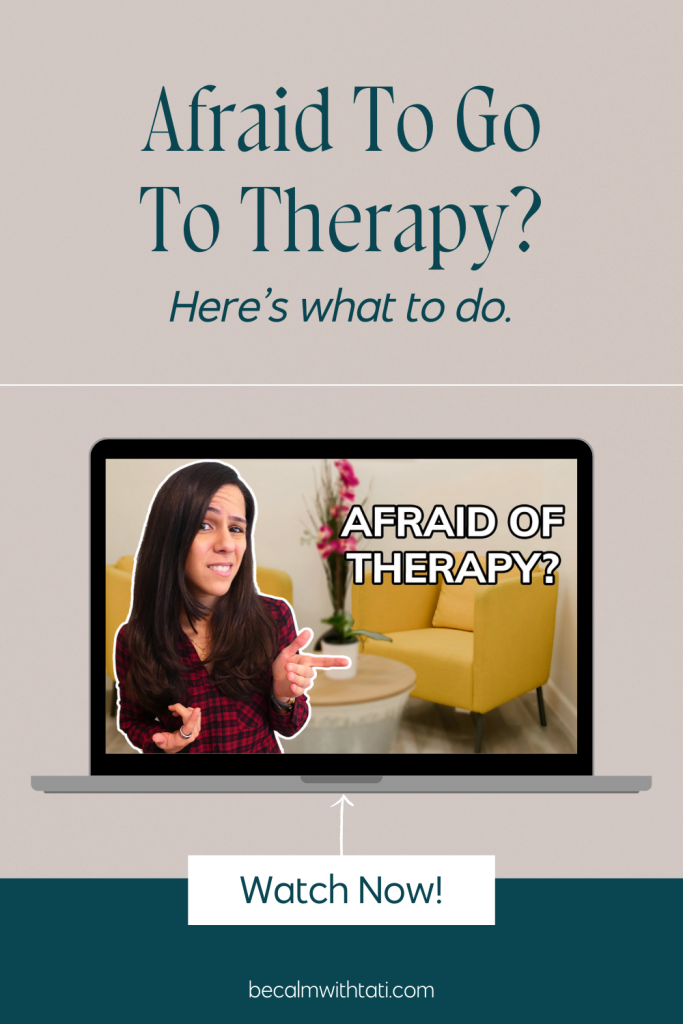
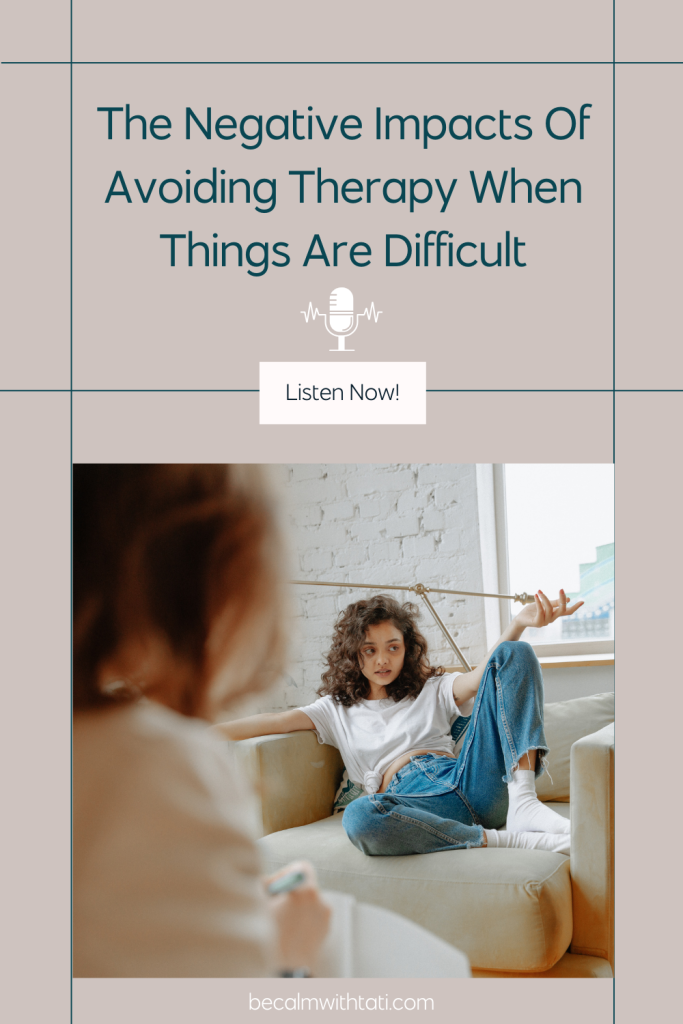
Until next time…




